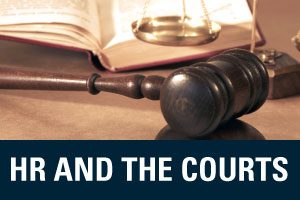by CUPA-HR | May 14, 2024
Each month, CUPA-HR General Counsel Ira Shepard provides an overview of several labor and employment law cases and regulatory actions with implications for the higher ed workplace. Here’s the latest from Ira.
Unions Representing Student Employees File Unfair Labor Practice Charges Related to Student Protests
Nearly 30 unions representing more than 100,000 student workers at 58 campuses throughout the country have issued a joint letter supporting protesting students and condemning violent responses to peaceful protests. Unfair labor practice charges have also been filed with the National Labor Relations Board against a small number of private institutions in protest of schools’ enforcement of their rules.
The NLRB has found in the past that civil rights protests — for example, those connected to the Black Lives Matter movement — are protected concerted activity when they are tied to protesting employer or employment discrimination matters. However, commentators have drawn a distinction related to the Israel-Hamas war protests. While each unfair labor practice case will rise and fall on the specific facts related to the situation, a university enforcing safety rules and cracking down on protests will likely not violate the National Labor Relations Act. Additionally, if a union member participates in a protest unrelated to their employment and violates university rules, the sanctions involved will likely not violate the NLRA.
Court of Appeals Affirms Dismissal of ERISA Lawsuit Against Georgetown University
The U.S. Court of Appeals for the District of Columbia Circuit unanimously affirmed the dismissal of an employee-filed Employee Retirement Income Security Act lawsuit. The lawsuit claimed that Georgetown University had packed its retirement plans with expensive and badly performing investment options.
The lawsuit further alleged that Georgetown had offered its faculty and staff retirement plans with too many investment options and retained multiple recordkeepers, which drove up the administrative costs of the plans. A federal district court judge dismissed the amended complaint in April 2023, ruling that the amended complaint did not address the concerns that led to the dismissal of the original complaint.
The Court of Appeals unanimously concluded that the original complaint failed to plead any adequate claims and the proposed amended complaint was futile as it did not cure the problem (Wilcox et al. v. Georgetown University et al. (Case no. 23-7059, DC Cir. 4/23/24)).
Student-Athlete NLRB Unionization Decisions May Modify Taxability of Athletic Scholarships
Although the NLRB’s decision in the Dartmouth College men’s basketball team case is under review, if the board affirms the decision that players are employees and can unionize, it could ultimately cause the IRS to rethink its current position that student-athletes receiving scholarships are not employees for purposes of the tax code. This could possibly include a change in the current position that these scholarships are not taxable as income.
If the NLRB affirms the regional director’s decision, which many commentators conclude is likely given its composition under the Biden administration, the decision is not binding for the IRS. The IRS has independent authority to conclude whether these student-athletes are employees and are receiving taxable compensation in the form of scholarships under the Internal Revenue Code. Separately, the courts are wrestling with the question of whether student-athletes are employees under the Fair Labor Standards Act and are entitled to minimum wage and overtime. We will keep following these issues as they unfold.
IRS Giving More Scrutiny to Tax-Exempt Status of Name, Image and Likeness Payments to Student-Athletes From Booster Donations
Bloomberg reports that the IRS has begun revoking and not granting 501(c)(3) status to some groups formed to collect money from boosters to fund name, image and likeness payments to student-athletes. In testimony before the Senate finance committee, the IRS commissioner stated that they are scrutinizing those NIL groups that are not operating for tax-exempt purposes. These collectives have raised millions of dollars from boosters who generally expect those gifts to be tax deductible. For specific tax guidance, a tax professional should be consulted on questions arising in this area.
U.S. Supreme Court Rules Job Transfers Can Violate Title VII and Other Anti-Discrimination Statutes
The Supreme Court ruled unanimously on the issue of whether a plaintiff must prove significant harm to state a claim of discrimination under the applicable anti-discrimination statutes because of a job transfer. The court reversed the holdings of some circuit courts of appeal that “significant harm” must be stated to state a claim of job discrimination resulting from a job transfer.
Nonetheless, the Supreme Court stopped short of eliminating the harm requirement entirely. The court held that a plaintiff must show that the transfer resulted in some level of injury or harm, concluding that the statute does not require by its terms the high bar of “significant” harm (Muldrow v. St. Louis (U.S. Case No. 22-193, 4/17/24)). The concurring justices, who did not dissent, argued that the change from significant harm to some other lower level of harm was confusing and would lead to further inconsistent litigation.
NLRB Reports 10% Rise in Case Load in First Half of Fiscal Year 2024
The NLRB reports that case filings of unfair labor practice charges or union representation votes rose 10% during the first half of fiscal year 2024 compared to the same period in the previous fiscal year. Union election petitions rose by 35% during this period, and unfair labor practice charges rose by 7%. The NLRB has jurisdiction over private institutions of higher education and has no jurisdiction over state-based public institutions. State public institutions are generally subject to state labor boards and state statutes with separate, but often parallel, rules. This uptick in private employer unfair labor practice charges and election petitions will likely be accompanied by an increase in activity by public-sector unions at public institutions of higher education.

